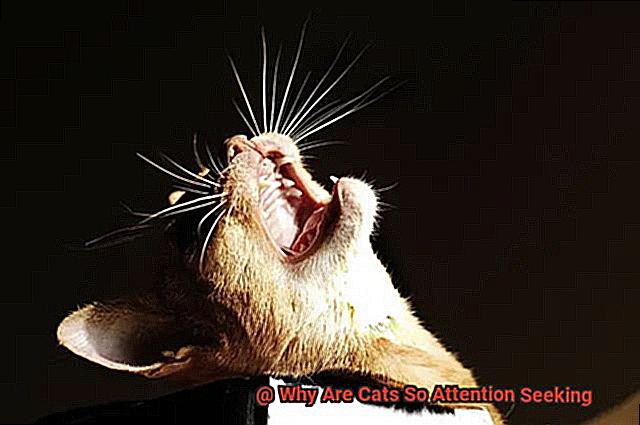Cats, those adorable and fluffy creatures that have stolen our hearts, are often seen as independent and aloof. However, anyone who has ever owned a cat knows that these feline friends can be incredibly attention-seeking. Whether they’re knocking over your coffee mug or meowing incessantly for pets, cats will do just about anything to get their owners’ attention. So why do cats crave attention so much?
Despite their reputation as solitary animals, cats actually thrive on social interaction with humans. They form strong bonds with their owners and love nothing more than spending time with them. But there’s more to it than just companionship; there are several reasons why cats seek out attention from their owners.
In this guide, we’ll explore the fascinating world of feline behavior and delve into the different reasons why cats crave attention. We’ll chat with experts in the field and conduct research to get to the bottom of this million-dollar question. From playful antics to affectionate purrs, we’ll take a closer look at what makes our furry friends tick.
So whether you’re a seasoned cat owner or simply curious about these enigmatic creatures, join us on this journey into the world of cats. You’ll discover why they’re so attention-seeking and what it means to be a cat parent. Get ready for some fun-filled adventures with your feline friend.
Cats are Social Creatures
Contrary to popular belief, cats are not solitary creatures. They are social animals that crave attention and affection from their owners. As experts have discovered, domesticated cats have been selectively bred over thousands of years to be companions to humans. Thus, they have developed a strong bond with their owners and consider them part of their pack.
One reason for this social behavior is that cats are pack animals by nature. In the wild, cats live in colonies and rely on each other for survival. They groom each other, play together, and even hunt as a group. This social behavior translates to domesticated cats who view their owners as part of their pack.
Additionally, cats are intelligent creatures that require mental stimulation. When left alone for long periods of time without any interaction, they can become bored and feel neglected. This can lead to destructive behavior such as scratching furniture or urinating outside the litter box.
Furthermore, cats rely on their owners for food, water, and shelter. By seeking attention, they ensure that their needs are being met and that they have a secure place in their home. This is especially true for indoor cats who do not have access to the outdoors.
As responsible cat owners, it is crucial to understand that providing our pets with love and interaction is essential to their happiness and overall well-being. Here are some tips:
- Spend quality time with your cat every day by playing with toys, grooming them, or cuddling on the couch.
- Provide mental stimulation by offering toys that encourage hunting and exploration or setting up a scratching post or climbing tree.
- Consider adopting a second cat so your pet has a feline companion to interact with.
- Pay attention to your cat’s behavior and body language as sudden changes in behavior may be signs of underlying health issues.
Boredom and Understimulation
Scratching the furniture, knocking things off shelves, and meowing incessantly are all common signs of boredom and under-stimulation in cats. As natural curious creatures, they require mental and physical stimulation to keep them engaged and entertained. In this article, we’ll explore how environmental enrichment, interactive playtime, and mental stimulation can help alleviate boredom in cats.
Environmental Enrichment:
Cats are natural explorers, and providing environmental enrichment is crucial for keeping them mentally stimulated. Here are some ways to keep your feline friend engaged:
- Toys: Keep your cat interested with a variety of toys. From balls and feathers to puzzle toys that challenge their minds, rotating their toys every few days is essential.
- Cat Trees: Cats love to climb and perch in high places, and cat trees provide elevated spaces for them to observe their surroundings.
- Scratching Posts: Scratching is a natural behavior for cats, and providing them with scratching posts can prevent them from scratching your furniture.
- Hiding Treats: Encourage your cat’s sense of smell and natural hunting instincts by hiding treats around the house.
Interactive Playtime:
Playing interactive games with your cat is an excellent way to bond with them while also providing mental and physical stimulation. Here are some interactive games you can try:
- Chasing a Toy: Cats love chasing after objects like toy mice or balls.
- Laser Pointers: Laser pointers can be used to play with your cat, but avoid overdoing it as they need rest periods between play sessions.
- Feather Wands: Stimulate your cat’s hunting instincts with feather wands and have fun interacting with them.
Mental Stimulation:

Providing mental stimulation is just as important as physical stimulation for your cat’s well-being. Here are some ways to keep their minds active:
- Puzzle Feeders: Challenge your cat’s mind and make mealtime fun with puzzle feeders.
- Hiding Food: Encourage your cat to use their sense of smell and natural hunting instincts by hiding food in different areas of the house.
- Training Sessions: Teach your cat new skills and strengthen your bond through training sessions.
Communication through Attention Seeking
But what drives this attention-seeking behavior, and how can you handle it?
The answer lies in the fact that cats are social creatures who use attention-seeking behavior as a way to communicate. They may be asking for food, water, or playtime, or they could be expressing their need for affection and reassurance from their owner. However, cats may also use attention-seeking behavior as a sign of stress or anxiety.
To help your cat manage their attention-seeking behavior and ensure their well-being, consider the following tips:
- Provide environmental enrichment: Boredom and loneliness can be common causes of attention-seeking behavior in cats. To keep your feline friend entertained and mentally stimulated, provide them with plenty of toys, scratching posts, cat trees, puzzle feeders, and interactive playtime. Training sessions can also be a great way to engage your cat’s curious mind.
- Consider adopting another cat: If your cat is lonely and craves companionship, consider adopting another feline friend. However, make sure to introduce them slowly and supervise their interactions to avoid any conflicts.
- Rule out medical conditions: If your cat suddenly becomes more vocal or clingy than usual, it could be a sign of an underlying medical condition. Consult with your veterinarian to rule out any health issues.
- Set boundaries: While attention from their owner is essential for cats’ well-being, it’s also essential to set boundaries and not reinforce negative behavior. For example, if your cat scratches the furniture for attention, don’t give in to their demands but redirect their behavior towards a scratching post.
- Understand the meaning behind the behavior: Attention-seeking behavior can have different meanings depending on the situation. For example, if your cat kneads on your lap, they may be showing affection and seeking comfort. On the other hand, if they scratch the furniture, they may be bored or stressed.
Signs of Health Issues
Our furry friends are notorious for disguising their pain and discomfort, so it’s essential to pay attention to any changes in their behavior or habits.
One of the primary indications that your cat is experiencing a health issue is a shift in their eating habits. If your cat stops eating or has a decreased appetite, it could be a sign of an underlying problem. Keep an eye out for other adjustments in behavior, such as lethargy, hiding, excessive grooming, or vocalization – these could all be clues that something is amiss.
Urinary tract infections (UTIs) are one of the most frequent health concerns in cats. If your cat is spending more time than usual in the litter box or vocalizing when using it, they may be experiencing discomfort due to a UTI. They may also urinate outside of the litter box or show signs of discomfort while urinating.
Dental problems can also cause cats to seek more attention from their owners. Drooling excessively, having bad breath, or avoiding hard food could be indicators of dental issues. Addressing any dental problems early on can prevent further complications.
Ensuring Proper Care and Attention
Cats are social animals that crave daily interaction and stimulation to remain happy and healthy. Neglecting their needs can lead to unwanted behaviors such as excessive meowing, destructive scratching, or even aggression. To ensure your cat is well-cared-for, here’s what you need to do:
Keep them entertained
Cats are natural hunters and love to play. Providing them with plenty of toys and activities that stimulate their natural instincts is crucial. Interactive toys such as feather wands, laser pointers, and puzzle feeders can keep them entertained for hours. Giving them a cat tree or other vertical space can also provide a place for them to climb, play, and relax.
Bond through playtime and grooming
Engage in daily play sessions with your cat. Not only does it provide much-needed exercise, but it also allows for quality bonding time between you and your feline friend. Grooming your cat regularly can also provide a calming effect while keeping their coat healthy and preventing hairballs.
Keep them healthy
Access to clean water and nutritious food is essential for your cat’s overall health. A healthy diet can help prevent obesity and other health issues, while a clean litter box can prevent litter box aversion. Providing a comfortable sleeping area and plenty of hiding spots can also help your cat feel safe and secure in their environment.
Show them love
Cats thrive on attention, so make sure they receive plenty of it. Spend quality time with them every day, whether it’s playing, cuddling or simply talking to them. When you show them love and affection, they’ll return it in spades.
The Benefits of Attention Seeking Behavior
From meowing incessantly for pets to rubbing against your legs until you give them attention, this behavior can sometimes be seen as demanding or annoying. However, it’s actually a natural behavior that has several benefits for both the cat and its owner.
First and foremost, attention-seeking behavior allows cats to bond with their owners. Cats are social animals that crave human interaction, so seeking attention from their owners is a way for them to fulfill this need. When cats get the attention they crave, they feel more secure and content in their environment. So, the next time your cat is seeking your attention, take it as an opportunity to strengthen your bond.
In addition to bonding, attention-seeking behavior also provides cats with mental stimulation. Engaging in play and interactive activities with their owners helps to keep cats mentally stimulated, which is important for their overall well-being. This stimulation can help prevent boredom and decrease the likelihood of destructive behavior such as scratching furniture or chewing on household items. So, grab some toys and get playing with your furry friend.
Attention-seeking behavior can also serve as a form of communication for cats. When a cat seeks attention from its owner, it may be indicating that it is hungry, thirsty, or in need of affection. By responding to these signals, owners can better understand their cat’s needs and provide them with the appropriate care. So, pay attention to your cat’s requests – they might just be trying to tell you something important.
Lastly, attention-seeking behavior in cats can be beneficial for their physical health. Engaging in play and interactive activities helps cats stay active and maintain a healthy weight. It can also help prevent health issues such as obesity, arthritis, and diabetes. So not only is playing with your cat fun for both of you, but it’s also good for their health.
How to Respond to Attention Seeking Behaviors
However, when they start to exhibit attention-seeking behaviors, it’s important to respond appropriately to ensure their needs are being met. Here are five sub-sections with tips on how to respond to attention-seeking behaviors in cats:
Understand the Why
Before you can address your cat’s attention-seeking behavior, it’s important to understand why they may be behaving this way. It could be boredom, lack of stimulation or interaction, anxiety, or even medical issues. Identifying the underlying cause will help you take the appropriate steps to address the behavior.
Provide Interactive Toys and Activities
Cats love interactive toys and activities that can stimulate their minds and bodies. Puzzle feeders, scratching posts, and laser pointers are all great options. Playing with your cat can also help reduce unwanted behaviors.
Reward Positive Behavior and Ignore Negative Behavior
When responding to attention-seeking actions, it’s important to reward positive behavior and ignore negative behavior. For example, if your cat meows excessively for attention, wait for a moment of quiet or positive behavior before rewarding them with attention or treats.
Establish Consistent Routines and Boundaries
Establishing a routine for playtime and interaction can help reduce unwanted behaviors. Additionally, providing a calm and comfortable environment can help reduce anxiety-related behaviors. If your cat tends to wake you up early in the morning for food or playtime, try setting a regular feeding and play schedule that works for both you and your cat.
Consult with a Professional
If the behavior persists despite efforts to address it, it may be necessary to consult with a veterinarian or animal behaviorist for further guidance. They can help identify any underlying medical issues or provide additional strategies for managing attention seeking behaviors in cats.
Tips for Keeping Your Cat Stimulated and Happy
A bored cat can develop behavioral issues, which can lead to stress and even physical health problems. To prevent this from happening, here are five tips to keep your cat entertained and content:
Toys Galore
Cats love to play and explore, so it’s essential to provide them with a variety of toys. Try to offer different types of toys such as balls, feather wands, stuffed mice, or interactive puzzles that challenge their minds. It’s crucial to rotate these toys regularly to keep your cat interested and engaged.
Cozy Living Space
Cats love comfort, so ensure their living space is cozy and comfortable. Provide soft bedding, scratching posts, and plenty of hiding places for your cat to retreat when they need some alone time. By giving them a comfortable living space, they’ll feel more relaxed and content.
Variety in Food
Cats can become bored with the same food every day, so it’s important to offer them a variety of flavors and textures. Consider rotating their food options or adding in some treats throughout the day. This way, your cat will be excited about mealtime.
Quality Time Together
Spending quality time with your cat is an excellent way to keep them happy and content. Play with them using their favorite toys, groom them or simply cuddle on the couch. This will help strengthen your bond and prevent them from becoming overly demanding for attention.
Hiding spots and Perches
Cats love to climb and explore, so providing them with hiding spots and perches can keep them entertained for hours. You can give access to high places like shelves or cat trees where they can hide or observe their surroundings.
Conclusion
In summary, cats are not just solitary creatures who prefer to keep to themselves. They are social animals that crave attention and affection from their owners. This need for attention stems from their desire for companionship, mental stimulation, and security.
To ensure our feline friends’ happiness and overall well-being, it is crucial to provide them with the love and interaction they need. Neglecting their needs can lead to unwanted behaviors such as excessive meowing, destructive scratching, or even aggression.
Fortunately, there are several ways to alleviate boredom in cats. Environmental enrichment, interactive playtime, and mental stimulation can help keep our furry friends active and healthy while also preventing health issues such as obesity, arthritis, and diabetes.
When responding to attention-seeking behaviors in cats, it’s important to understand the underlying cause of the behavior before taking appropriate steps to address it. Establishing consistent routines and boundaries can help reduce unwanted behaviors. If these efforts prove unsuccessful, consulting with a veterinarian or animal behaviorist may be necessary.
By providing your cat with toys galore, a cozy living space, variety in food choices, quality time together, hiding spots and perches you will ensure that your furry friend is well-cared-for and content.







